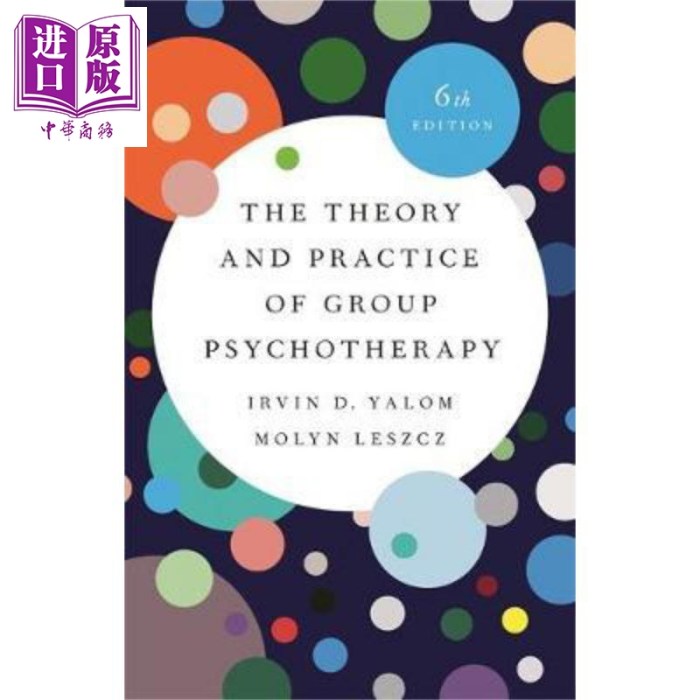The theory and practice of group psychotherapy 6th edition – The Theory and Practice of Group Psychotherapy, 6th Edition, provides a comprehensive overview of the history, theories, and practice of group psychotherapy. This authoritative text explores the evolution of group psychotherapy, major theoretical approaches, and the practical application of group techniques.
From its origins to the present day, group psychotherapy has evolved into a powerful therapeutic approach for addressing a wide range of mental health issues. This text traces the historical development of group psychotherapy, examining the major theoretical influences that have shaped the field and explaining how the practice of group psychotherapy has evolved over time.
The Evolution of Group Psychotherapy
Group psychotherapy has a rich history, dating back to the early 20th century. Its origins can be traced to the work of Jacob Moreno, who developed psychodrama in the 1920s. In the 1930s, S.H. Foulkes began using group therapy to treat patients with mental illness.
By the 1950s, group psychotherapy had become a widely accepted treatment modality.
The major theoretical influences that have shaped the field of group psychotherapy include psychoanalysis, cognitive-behavioral therapy, humanistic psychology, and interpersonal theory. Psychoanalysis emphasizes the role of unconscious processes in group dynamics, while cognitive-behavioral therapy focuses on changing maladaptive thoughts and behaviors.
Humanistic psychology emphasizes the importance of self-actualization and growth, while interpersonal theory focuses on the relationships between group members.
The practice of group psychotherapy has evolved over time, with new techniques and interventions being developed. In the early days of group therapy, the therapist was often seen as the leader of the group. However, over time, the therapist’s role has become more facilitative, with the group members taking on more responsibility for their own treatment.
Theories of Group Psychotherapy
There are a number of different theoretical approaches to group psychotherapy, each with its own strengths and weaknesses. The most common approaches include:
- Psychodynamic group therapy
- Cognitive-behavioral group therapy
- Humanistic group therapy
- Interpersonal group therapy
Psychodynamic group therapy is based on the principles of psychoanalysis. It focuses on the role of unconscious processes in group dynamics and on the relationship between the therapist and the group members. Cognitive-behavioral group therapy is based on the principles of cognitive-behavioral therapy.
It focuses on changing maladaptive thoughts and behaviors and on teaching group members new coping skills. Humanistic group therapy is based on the principles of humanistic psychology. It focuses on the importance of self-actualization and growth and on creating a supportive and growth-promoting environment for group members.
Interpersonal group therapy is based on the principles of interpersonal theory. It focuses on the relationships between group members and on how these relationships can be used to promote growth and change.
The Practice of Group Psychotherapy

Group psychotherapy is typically conducted in a series of weekly or bi-weekly sessions. The sessions are typically 90 minutes to 2 hours in length. The group is usually composed of 6 to 12 members, and the therapist typically facilitates the group process.
The stages of group psychotherapy include:
- The initial stage
- The working stage
- The termination stage
In the initial stage, the group members get to know each other and the therapist. They also begin to develop a sense of trust and safety. In the working stage, the group members work on their individual and group issues.
They may explore their feelings, thoughts, and behaviors, and they may learn new coping skills. In the termination stage, the group members prepare to end their time together. They may reflect on their experiences in the group and say goodbye to each other.
Special Issues in Group Psychotherapy

There are a number of special issues that can arise in group psychotherapy, including:
- Working with different populations
- Ethical considerations
- Research evidence
Working with different populations requires the therapist to be aware of the unique challenges and opportunities that each population presents. For example, working with children requires the therapist to be aware of the developmental needs of children. Working with adolescents requires the therapist to be aware of the unique challenges that adolescents face, such as identity formation and peer pressure.
Working with older adults requires the therapist to be aware of the unique challenges that older adults face, such as retirement and health issues.
Ethical considerations in group psychotherapy include:
- Confidentiality
- Informed consent
- Dual relationships
Confidentiality is essential in group psychotherapy. The therapist must ensure that the information that is shared in the group is kept confidential. Informed consent is also essential. The therapist must ensure that the group members understand the risks and benefits of group therapy before they agree to participate.
Dual relationships are relationships between the therapist and the group members that are outside of the therapeutic relationship. These relationships can be problematic because they can compromise the therapist’s objectivity and the group members’ trust.
Research evidence supports the effectiveness of group psychotherapy for a variety of mental health conditions. Group psychotherapy has been shown to be effective for treating depression, anxiety, substance abuse, and eating disorders. It has also been shown to be effective for improving social skills and relationships.
Q&A: The Theory And Practice Of Group Psychotherapy 6th Edition
What are the major theoretical approaches to group psychotherapy?
The major theoretical approaches to group psychotherapy include psychodynamic, cognitive-behavioral, humanistic, and interpersonal approaches.
What are the different stages of group psychotherapy?
The different stages of group psychotherapy include the initial, working, and termination phases.
What are the roles of the therapist and group members in the group process?
The therapist’s role is to facilitate the group process, create a safe and supportive environment, and help members achieve their therapeutic goals. Group members play an active role in the group process, providing support, feedback, and challenge to each other.

